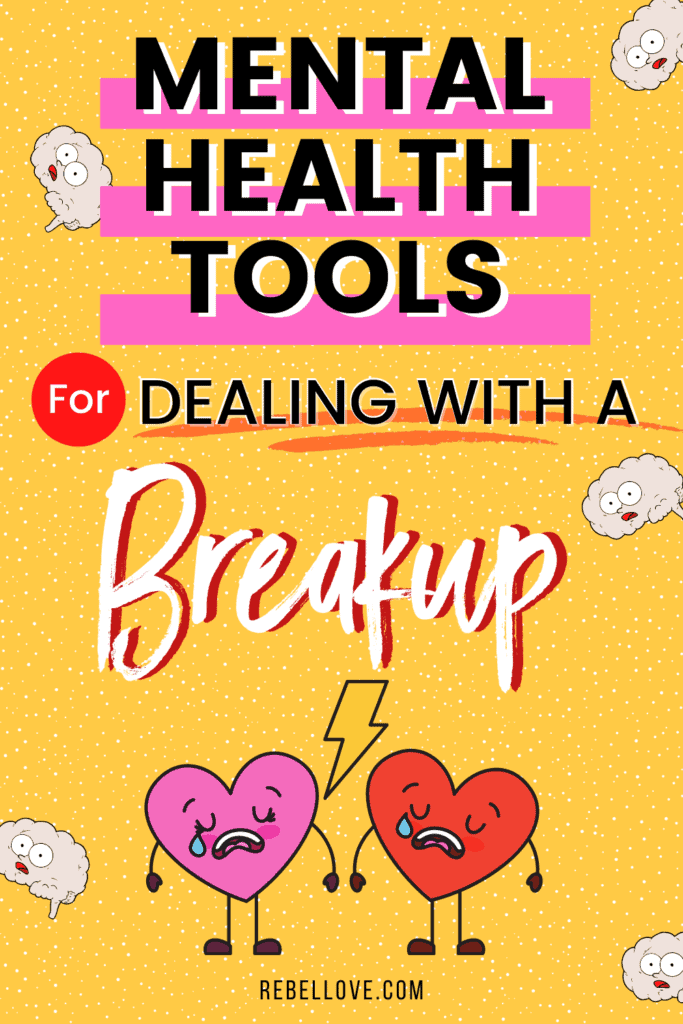This post may contain affiliate links and Rebel Love may be compensated for purchases visitors make through these links. We only promote products and services we really care about and that we think are useful. Read the full policy here.
Coping with love loss can be a painful endeavor. A broken heart can destabilize even the strongest among us. Break ups can cause both emotional and physical pain. They make you feel helpless and left without direction. Some breakups are a long time in the making, while others seem to come straight out of left field.
Whether your breakup is a surprise or the result of a noticeably slow separation, the stress can be difficult to deal with. Be it a fallout with a friend, a friends-with-benefits blunder, or the termination of a romantic relationship, successful breakups require a high level of consciousness, support, and personal care. Because Rebel Love is passionate about your wellbeing, the love you share, and the relationships you have, we’ve put together these mental health tools for dealing with a breakup!
Consciousness
Following a breakup, you may find yourself coping with pain, stress, and processing intense emotions. To promote healing, it’s useful to keep a high level of consciousness through each stage of the breakup, and the time that follows the end of a relationship.
What does it mean to have a high level of consciousness, exactly?
Simply put, it means being aware of your thoughts and feelings and remaining intentional about how you support yourself. The decisions you take for your own healing will make the difference in how long you experience grief, and how quickly you begin to feel better. Being conscious post-breakup means taking the right steps to get back on your feet, accessing your feelings, regardless of how painful they are, and choosing helpful and positive behaviours and activities that allow you to acknowledge and metabolize that grief and pain, without prolonging suffering.
Support and Self Care
Support and self-care are key pillars in coping and healing from a breakup. Fundamentally, this means choosing health and mood-enhancing activities and behaviours, as well as surrounding yourself with loved ones – such as friends and family – who bring out the best in you, lower stress, and support your wellbeing and forward movement.
The Inside Job
These are also inside jobs. When you give yourself space and time to process your emotions, you learn to rely on yourself, which builds self-esteem and resilience and offers hope for future partners, friendships, and relationships, and the capacity to judge whether they’re right for you quicker.
Professional Support
Support could also come in the form of professional help, such as seeking a therapist or other services that create space for you to access, acknowledge, talk about and process your feelings. Healing is the primary goal following a breakup. Support and personal care are the bedrock for emotional health and personal growth.
Breaking Up is Hard

Let’s face it, breakups suck! There are a myriad of reasons why people break up, including falling out of love, infidelity or other perceived betrayals, or major incompatibilities relating to sex, money, parenting, lifestyle, beliefs, political views, etc.
Dealing with breakup can be painful and life-altering for some, while others accept it as a part of their story, bouncing back seemingly unencumbered. For those currently going through a breakup, I understand the latter may seem impossible. I am here to ensure you that it is not. I’m not saying you will get through the breakup unscathed, or without having to process some feelings. What I am saying though, is you can experience a healthy breakup, leaving your relationship with as much (if not more) self-respect and confidence as when you entered it.
Letting go of a person who isn’t right for you, although painful, allows you to focus on your own feelings, your own wellbeing, your own story, and during this process you might find a sense of self you’ve forgotten, lost or neglected.
Dear reader, remember there is no “normal” amount of time one grieves or heals; however, there are things that may extenuate or prolong the grief or healing. To start coping and feeling better, follow these tips and mental health tools for dealing with a breakup.
Post Breakup A-Team
Guys, it’s time you become the expert on you. You need to get good at knowing yourself because let’s face it, you belong to you first. Remember, consciousness!
Understanding who you are and what you need extends to the people around you. When dealing with a breakup, you may trick yourself into believing certain mood-demoting behaviors are helpful, and you may even begin to surround yourself with people who encourage stress-inducers. That is why during this time it is critical that you identify your A-Team.
How do you identify your A-Team?

These people want the best for you, and will support your healthy path forward. Recognizing these people may not always be easy, especially in your vulnerable state. They may be friends and family members, but ultimately, they are people you trust. They will meet you with compassion and create space for you to openly talk about your feelings without judgement. They will be realistic and honest about the relationship you’re grieving, and encourage or guide you towards things that bring you joy.
Post-breakup, speaking to and hanging out with your A-Team should become a normal thing. You may notice that certain friends and family hinder your healing during this time. Putting distance between yourself and them may be difficult; however, it is an empowering move!
Unsure how to properly distance yourself from people without hurting them?
Use a version of the line below:
“Hi ____, I hope you’re doing alright. As you know, ____ and I recently broke up. I’m reaching out to my circle to let them know I’m taking a step back to focus on me during this time, so please don’t be alarmed if you don’t hear from me for a while. Thanks for understanding! Here’s to better days…”
This message is safe because you are making it about you rather than them. Keep in mind that if you receive a negative response to this request, considering the validity or health of that friendship may be something to look into. Additionally, if you set boundaries with people during this time (or ever), and they don’t respect them, it is also a sign to reevaluate the space they occupy in your life.
Joy-Boosting Activities
Joy-boosting activities are essentially things that enhance your health and mood. These activities release feel-good hormones, or allow you to work through difficult emotions. Here is an unexhausted list; however, you are the expert on what makes you feel good. I suggest finding one to three things (depending on how time consuming and accessible they are) that can be implemented on a daily or weekly basis.
Journaling
As a writer, I know the importance of journaling. Think of it as your personalized therapist; a place you can unleash all of your feelings without judgment, and walk away lighter and oftentimes with more clarity. The types of journaling that I recommend are free-flow and gratitude.
Free-Flow Journaling (FF)
Free-flow journaling is simply opening a notebook and dumping your thoughts on the page. This practice is simple and can take as little as five minutes, but has profound effects. I can honestly say it’s assisted me in silencing my inner-critic, becoming more conscious throughout the day, and finding solutions to private issues. It was also an outlet for a breakup that seemed impossible to recover from.
When done habitually, FF journaling is illuminating! It cleans out the internal closet, and helps you rediscover lost treasures beneath the muck.
Gratitude Journaling
Gratitude journaling is the simple process of opening your notebook and answering one (or more) of the following prompts:

🖤 What are five things I am grateful for?
🖤 Who are five people I am grateful for, and why?
🖤 Name the three best things that happened today?
🖤 What skills or abilities did I utilize today that I am proud of?
🖤 What was the best lesson I learned today that I can carry with me tomorrow?
Studies have proven that implementing a gratitude ritual has enormous benefits on health and longevity, mood, and resilience. When gratitude is present, stress emotions (sadness, grief, etc.) have nothing to feed on and no place to live. This is an incredible resource when dealing with a breakup, because it allows you to lean on what’s working in your life, and takes the focus off what didn’t work.
My recommendation is to start your day off with FF journaling (for clarity and headspace) and end your day with gratitude journaling (happy boost).
Movement and Body-Curiosity
A healthy mind requires a healthy body. A healthy body* requires movement and curiosity.
Think back to when you were a kid. What adventures did you go on? What was accessible to you?
I’m going to guess that your imagination and playfulness were the vehicles to your joy. As we grow and get bogged down with responsibilities, things such as education, career, and relationships take precedent over movement, play, and presence. As a result of that, and the increasing use of devices, the majority of us live sedentary lifestyles.
Tapping back into your body and renewing your relationship with it will only improve your self-esteem, and therefore, your overall life experience.
If you need tips on how to get back to youthful body curiosity, here are a few questions to explore:

🖤 What childhood adventures can you recreate? What childhood adventures did you miss out on, but have the opportunity to pursue now?
🖤 What kind of movement would help you feel better in your skin? Do you wish you were stronger? More flexible?
🖤 What kind of relationship do you have with your body presently, and what kind of relationship do you wish you had with your body? What is the next, simplest step you can take to bridge that gap?
🖤 What small experience or habit can you implement on a regular basis that will promote your body-mind connection?
By returning to the source – your body – and learning how to live in it consciously, you become able to say yes to your joy, your health, your quality of life!
Pick Up a New (or Old) Hobby
Related to movement and body-curiosity: what new or old hobby can you reintroduce to your life? Do you have a reliable friend who you can partner up with, and pursue a hobby together?
Finding a hobby that fulfills you could offer a fresh sense of independence and a positive distraction from the loss of your relationship. It may also expose you to new people or deepen a relationship you have with an existing friend.
Hobbies bring new challenges, new people, and exposure to individuals with similar interests. By prioritizing things you enjoy, you could gain a sense of autonomy and community simultaneously, learn more about yourself, and even experience personal growth! Adopting a hobby is a surefire way to open yourself to new beginnings, and reduce fear and negative feelings associated with that breakup.
Self-Concept Rituals
Let’s be real, a breakup rarely leaves us feeling like a whole person. When we lose friends or a partner, we tend to lose pieces of ourselves – or so it feels. Depending on the type of relationship that was terminated, and how the break occurred, you may feel shattered and uncertain how those pieces will look once reassembled.
Once the breakup is finalized, the next step should be plotting out self-concept rituals for damage control. Of course, you will have your A-Team ready to go; however, the most important relationship to nurture during this time is the one with yourself. Although healing will take time, positive, forward momentum doesn’t have to.
What are self-concept rituals?
These are recurring actions you will take that bring you back to your authentic core. These rituals are the backbone to your healing process. They will build your confidence, and allow you to accept and cope with the breakup, while maintaining the integrity and responsibility for your own wellbeing.
The pain breakups cause can be unprecedented. A catalyst to reduce future suffering is by building a foundation of self-worth. Here’s how:
Meditation
According to the Mayo Clinic, “Meditation can give you a sense of calm, peace and balance that can benefit both your emotional well-being and your overall health. And these benefits don’t end when your meditation session ends. Meditation can help carry you more calmly through your day and may help you manage symptoms of certain medical conditions.”
In other words, meditation can decrease negative feelings both during and outside of the practice! There are many types and forms of meditation – from guided to mantra to yoga – and finding the right one for you only takes a search online and a bit of time.
Cry
Regardless of the messages you received growing up, I’m serious when I say crying is good for you. Although you don’t need to ritualize crying, it’s important to listen to your body and allow it the release it needs. Here’s why…
Crying not only carries stress hormones out of the body, it also releases feel-good hormones within the body.
Don’t believe me, hear it from Harvard:
Crying is an important safety valve, largely because keeping difficult feelings inside — what psychologists call repressive coping — can be bad for our health. Studies have linked repressive coping with a less resilient immune system, cardiovascular disease, and hypertension, as well as with mental health conditions, including stress, anxiety, and depression. Crying has also been shown to increase attachment behavior, encouraging closeness, empathy, and support from friends and family.
Masturbation
Similar to crying, masturbation is a natural phenomenon that has been demonized, and yet the health benefits are hard to ignore. As I wrote on Call of the Quean for Masturbation Month, masturbation has the ability to reduce stress, enhance quality of sleep, boost concentration, elevate mood, reduce menstrual cramping, and alleviate pain.
Masturbation is also just fun! It connects you to your own body and pleasure, and teaches you what kind of touch you enjoy. Setting aside time to connect with your body in this way is something I highly recommend. Check out the full article here.
Leave the Ex in the Past
Leaving your partner entirely in the past is a difficult task, but if we’re taking responsibility for our wellbeing, this is a must.
Whether your breakup was civil or an absolute disaster, we recommend you follow through with this quick checklist. Why? Because moving on means letting go, and it’s hard to let go when you’ve got bits of them all over the place.
Distance yourself physically and mentally
This means limited or no contact with them, their friends, or their family. If you have children with an ex-partner and find interactions particularly difficult, reduce communication. Setting and respecting boundaries should be a priority. For example, making interactions about the children, and not your relationship.

Avoid places you know they frequent (great time to find fun, new spots of your own!), and get rid of their things. I’m not saying to have a dumpster fire, necessarily, but even shipping them a box of their belongings, or donating what they left behind.
It’s also a good idea to remove photos you have of them from obvious places. I know some people would say to go through social media and remove any images you have of the two of you together; however, my suggestion is to take a break from social media in general. Going on a deleting rampage may backfire, as it puts you face-to-face with the “happy” moments you shared – because, let’s face it, no one has pictures of the hard times.
The point here is to purge your life of anything that causes emotional regression. To cope productively, you’ll need to be brutally honest with yourself. It’s easy to think their favorite sweater offers comfort – but when you have it on, sinking into its scent and warmth, you’re not doing your heart any good! It’s okay to feel what you feel, but you determine how long you sit in your suffering.
If all else fails, contact your A-Team. That’s what they’re here for!
Myth Busters
Now that you’ve done the work it’s important to talk about what not to do.
We’ve all heard the myths of how to handle a breakup. We’ve all probably done a few of these things (guilty!). But, for the sake of your future, happy self, I’m going to give you a quick reminder of the do-nots post breakup.
Get over someone by getting under another
As you know, we here at Rebel Love are sex-positive and in no way are trying to cock- or clit-block you; however, it’s important to recognize the difference between an ego-driven sexual experience and an intentional one.
What’s the difference?
At the end of an ego-driven sexual experience, one usually feels worse than better. These encounters are usually an attempt to fill the void of your ex, repress feelings, or prove that you still got it. These experiences are contracting (harmful).
Whereas an intentional sexual experience is a conscious decision to share a positive, pleasurable exchange with someone you have connected with on a certain level (criteria varies). These experiences are protracting (beneficial).
Party like a Rockstar
Alcohol and drugs will not – I repeat, will not – help the pain. They might, however, temporarily mask it. The aftermath looks something like this: prolonged healing, possible relapse (i.e., drunk texting at early hours in the morning), followed by amplified negative emotions including regret, anxiety, desperation, depression, and lack of self-worth.
Sounds fun, right?
That brings me to the next point…
Avoid Stress-Inducers
We are only human, so you’re bound to make mistakes. However, I believe that if you raise your consciousness and approach yourself with patience, compassion, and forgiveness, you will be surprised by the results. Being aware of what and who cause you stress makes it easier to draw boundaries. But, as I mentioned before, the most important relationship to nurture during this time is the one with yourself. That means being brutally honest in each passing moment.
For example, feeding your need to know what your ex is up to by hanging out with that one friend who has all the gossip, is only going to stunt your progress.
Stalking your ex on social media – although unbeknownst to the rest of the world – will leave you with an emotional hangover. Put the phone away. Breathe. Let the moment pass. Contact someone you can trust. Talk to them about how you feel. Be the best person for yourself.
Help is On the Way
If you are struggling over a lost relationship there are professional services available. Ask your General Practitioner for referrals to mental health professionals or check out some of the resources below:
In This Together
Regardless of how painful your situation is, you are not alone. Ending a relationship and experiencing heartbreak is a human phenomenon, and I can say, on behalf of the Rebel Love Team, we’ve all been there. Your pain is not exclusive, and being a part of this community means you have people who will hear you.
Until next time,
Love yourself first…
Quean Mo xx
* When using the expression “Healthy Body,” there is no specific definition attached. We understand that life is experienced differently for every body, regardless of shape, size, and ability. What is accessible for one person, may not be for another. We acknowledge that the criteria is individual, and encourage people to explore what works best for them, to create their most fulfilling life experience.